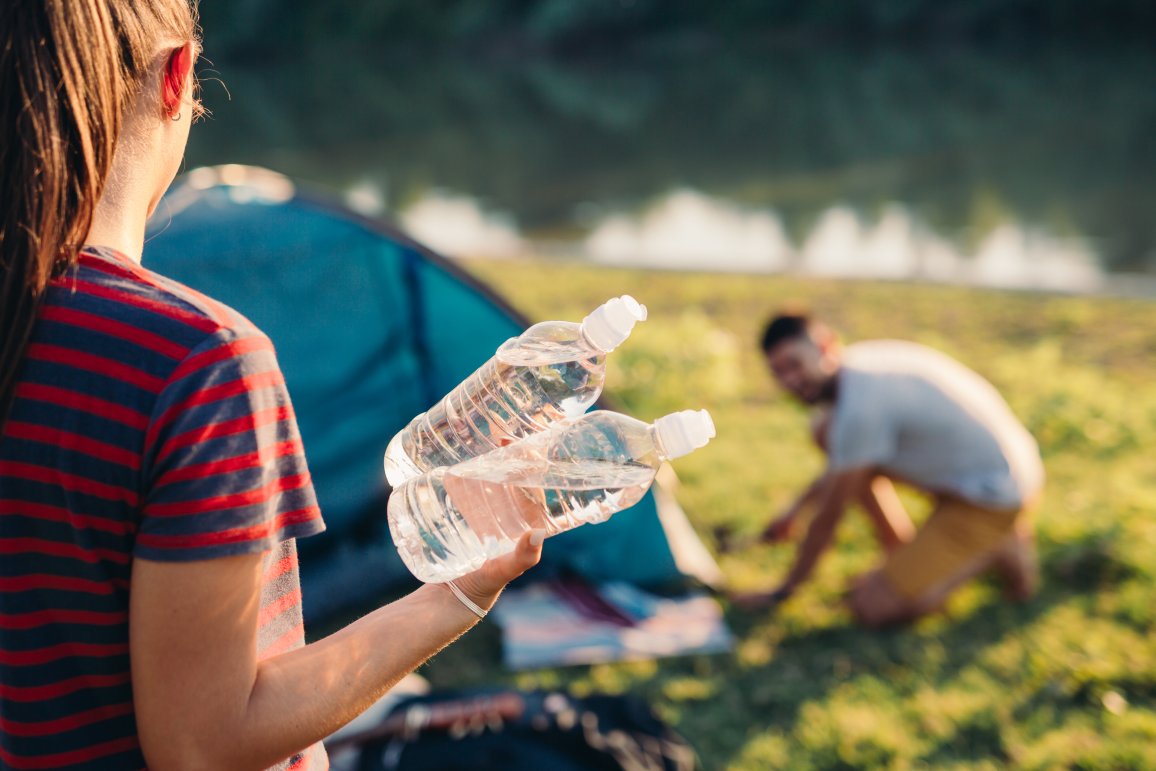Clever camping: PET-bottles as versatile and safe helpers
Nature, adventure and freedom: whether in a tent or motorhome, camping is all the rage. PET-bottles prove to be an advantageous companion when it comes to supplies for on the go or outdoors: they are hygienic, have a low weight, do not break and can be easily recycled after use if disposed of properly. Camping experts confirm this.

PET-bottles prove to be an advantageous companion when it comes to supplies for on the go or outdoors.
Useful and sturdy
There are more than 2,800 open campsites in Germany with almost 210,000 pitches. In 2023, over 42 million overnight stays were registered there. Most campers cater for themselves on the road and on site, which is why it is important to think carefully about which provisions to pack - not only for reasons of space, but also for safety during transportation and storage.
PET-bottles have proven to be helpful and solid utensils for camper vans: they are light, practical and remain extremely robust even in extreme conditions - unlike glass bottles. This is also the opinion of John Bexkens, Vice President of the Reisemobil Union, the association of German motorhome enthusiasts with the largest number of members, who says of glass bottles: "The obvious disadvantages are the risk of breakage and therefore injury, as well as the high weight. The payload for motorhomes and caravans is limited." The difference is definitely noticeable: an empty 1-liter PET bottle weighs just under 20 to 30 grams, while an unfilled glass bottle weighs around half a kilo.
If glass bottles break, they can actually pose a serious risk - even within the vehicle, for example through swerving or braking maneuvers. This is why Uwe Frers, CEO of PiNCAMP, the ADAC (General German Automobile Association) camping portal, says in a brief interview (see box): "When traveling by caravan, campervan or motorhome, the safe storage of drinks bottles plays a major role." He points out: "Anyone handling glass bottles in a small area, for example in a motorhome, must always expect a pile of broken glass." And says: "If disposal is guaranteed, the plastic bottle is a safe alternative to the glass bottle." This also applies to camping sites, especially where children and pets are present. Or for overnight stays at open-air concerts and festivals, where glass bottles are usually not allowed anyway for safety reasons.
Economical and sustainable
Campers value their independence and especially their proximity to nature. In this context, "plastic" proves to be "fantastic": Those who choose bottles made of PET make an environmentally sensible choice. This is because, during production and transport, plastic bottles save a lot of energy and emissions compared to glass due to their low melting point and light weight.
Properly disposed of, used PET-bottles are also easy to recycle - thermally into fresh energy or materially into new products. Also in the form of DIY projects: Empty plastic bottles can be converted into a variety of useful objects in just a few simple steps, including funnels, storage containers and simple lanterns. Filled with sand, plastic bottles can even be turned into play cones.
Conclusion: PET bottles and the responsible use of them help to make camping safer and easier on the one hand, and to protect the environment on the other.
Short interview:
3 questions for Uwe Frers, CEO of PiNCAMP, the ADAC camping portal
1. What is the best way to transport and store drinks when camping?
Uwe Frers: When traveling with a caravan, campervan or motorhome, the safe storage of beverage bottles plays a major role. Nobody wants to see a bottle of water flying out of the kitchen shelf towards the windshield during emergency braking or a quick evasive maneuver? Therefore: Always stow drinks bottles close to the floor and in the center of gravity of the vehicle in a lockable compartment and, if available, secure them with a lashing strap to prevent them from slipping.
2. What are the disadvantages or dangers of glass bottles when camping?
Luck and glass, how easily they break. This proverb says something about the potential dangers of glass bottles. Anyone handling glass bottles in a small area, for example in a motorhome, must always expect a pile of broken glass. This is why recyclable plastic bottles or refillable containers made of plastic or metal are generally the better choice. In addition, glass bottles are significantly heavier than plastic bottles. Since every gram counts with the tight load limits in caravans and motorhomes, plastic bottles are certainly an advantage.
3. Provided they are disposed of properly, are plastic bottles a safe alternative?
Definitely yes, plastic bottles do not splinter, are lighter and break less often than glass bottles. If disposal is guaranteed, the plastic bottle is a safe alternative to the glass bottle.
Do you like our texts? Perhaps even so much that you want to use them in your own media? Then please get in touch with us beforehand!
